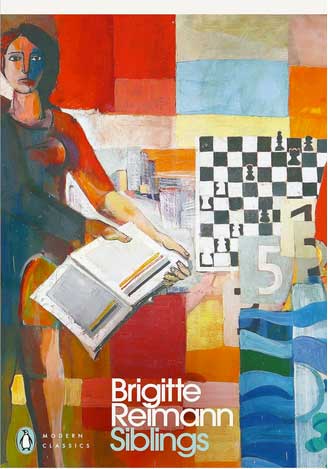Star 111, Lutz Seiler (And Other Stories)
Siblings, Brigitte Reimann (Penguin Classics)

Star 111 is a hefty novel that has been a bestseller and literary prize nominee abroad and is now translated into English and published alongside a book of poems and a non-fiction title by the same author. It is set in Berlin in 1989, just after the fall of the Wall, and charts the brief few months from then to Germany’s unification, through the eyes of Carl.
Carl’s parents Inge and Walter surprise him, and possibly themselves, by packing rucksacks and heading for a new future in the West, via transit camps, leaving Carl in charge of their orderly house, possessions, car and past. They soon disappear from most of the main story, although they send missives and cryptic postcards throughout the book, mostly charting their navigation of landscape and bureaucracy, whilst hinting at their future plans.
Carl, spurred on by his parents’ departure, drives to Berlin and soon finds himself involved with the squatting communities springing up in the East. Abandoned or vacant properties provide accommodation, galleries and community cafés, and Carl – who has previously worked as a bricklayer – is in demand for his practical skills. He returns to his parents house to liberate his father’s tools and dives in to the emerging new culture.
He is, it seems, slightly out of his depth. He misreads the signs with women and is not as politically motivated as others are, but is glad to finally have his own space where he can sleep and work on a bench he constructs. He becomes a kind of bar manager in the basement they have half-converted into a drinking den, and takes on board the ideas and politics of ‘The Shepherd’, the group’s leader; he also learns to milk Dodo, the leader’s companion goat and familiar.
In fact, goat’s milk is a kind of elixir or tonic throughout the book, an almost magical drink that resuscitates and re-energises, even when mixed with vodka. And poetry serves a similar purpose for Carl, as he struggles to become a writer whilst grappling with the nuances of alternative politics, under-the-radar guerrilla tactics, caring for elderly or sick residents around them, as well as struggle to contain his lust and maintain his new relationships and friendships.
Berlin is, perhaps, the main character in Star 111 (which was, since you asked, the make of an East German transistor radio). The book charts the slow changes at work: monetary pressures, Capitalist attitudes, property development, demolition, aspiration, the withdrawal of Russian troops (a friendly group who drink in the bar), and realisation. The hoped-for alternative society will not happen, there are too many tragedies, arguments, break-ups and despairs. People move on, the city will change, the counterculture will be commodified; tactics of resistance will have to change and adapt.
For those of us who only saw the images of the Berlin Wall collapsing on television, having assumed it was a fact of life that would be there forever, this is an eye-opening and engaging novel, rooted in real events, activities and movements from a very specific time and a forgotten history. The decay, disruption and despair was all too real, as was the flight of many East Germans and the selfish and racist attitudes of some in the West. Carl seems to decide to stay in Berlin, though his time in Assel, the squatted area, is up, and both Dodo and his parents find release and liberation, but there is no grand happy ending. Dreams and love have expired, writerly ambition has not (yet) reaped its rewards, friends and colleagues disappear, his parents – although in touch and able to visit and be visited – now live elsewhere. This book is partly about growing up, about family, politics, and utopian societies, but mostly it is about searching for authenticity and purpose. It’s a brilliant, wide-ranging and compulsive read.
Back in time, in a very different novel, we find Elisabeth, Uli and Konrad, the siblings of Reimann’s book, struggling to find their place in the world of 1960 as the East/West German border closes. Konrad has already defected, Uli questions and criticizes what he regards as an oppressive regime, whilst Elisabeth – an aspirational artist – embraces the future possibilities that Socialism offers.

Siblings, first published in 1963, is a very different book to Star 111. It is a fifth of the length for starters and is much more ‘literary’ and philosophical, much less led by narrative events. To be honest it is a little dry, with some characters mostly acting as ciphers for various political and business stances. Elisabeth’s boyfriend, Joachim, is a somewhat unbelievable ambitious and greedy capitalist, who consistently argues with Uli, a more believable but somewhat arrogant presence. (More likeable than Joachim though!)
Elisabeth joins an artist community, although as good Socialists it seems to also be a kind of (voluntary) labour camp, where work of some kind has to be done in exchange for accommodation and the freedom to do your own creative work. She struggles with the machinations of ‘the party’, or at least some members of it, and has to overcome sexism and personal criticism as well as her own inner demons and familial expectations.
In a way the book ends where it starts: different characters in different places with different hopes and aspirations, unable to communicate across ideological divides and struggling to find their place in ‘the new society’ of East Germany. Joachim suggests to Uli that ‘by stepping over the border [to the West], you’re stepping into the past’, choosing to find refuge in new technology and business opportunities but also acting as a Party informant and social irritant. Elisabeth tells herself she is a painter and that is enough to justify her place in the future state, but it is Uli, however, who has the last word. ‘What kind of people are you anyway?’ he asks Elisabeth and Joachim, although it also seems a question to himself and for all of us.
Rupert Loydell
.
